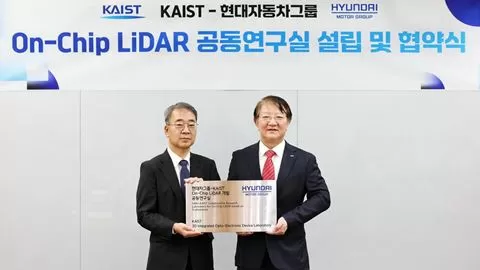Hyundai Motor Group and KAIST (Korea Advanced Institute of Science and Technology) have joined forces to establish a new research lab at the KAIST HQ in Daejeon, South Korea. The joint research lab, named the Hyundai Motor Group-KAIST On-Chip LiDAR Joint Research Lab, aims to develop cutting-edge LiDAR sensors for advanced autonomous vehicles.
LiDAR (Light Detection and Ranging) technology is a key component in the development of self-driving cars. It uses laser beams to create high-resolution 3D maps of the surrounding environment, allowing autonomous vehicles to accurately detect and navigate through obstacles. However, the current LiDAR sensors on the market are expensive and bulky, making them a major obstacle in the mass production of autonomous vehicles.
This is where the new joint research lab comes in. By combining the expertise of Hyundai Motor Group, one of the world’s leading automotive companies, and KAIST, a top research university in South Korea, the lab aims to develop on-chip LiDAR sensors that are not only more affordable but also smaller in size.
The lab will be equipped with state-of-the-art facilities and will be staffed by a team of experts from both Hyundai Motor Group and KAIST. The team will work together to develop LiDAR sensors that are not only cost-effective but also have a higher level of accuracy and reliability. This will be achieved by utilizing KAIST’s advanced research capabilities and Hyundai Motor Group’s extensive experience in the automotive industry.
The joint research lab is also expected to play a crucial role in accelerating the development of autonomous vehicles in South Korea. With the government’s goal of having fully autonomous vehicles on the road by 2027, the lab’s research and development efforts will be crucial in achieving this goal.
In addition to developing on-chip LiDAR sensors, the lab will also focus on developing new technologies and algorithms for autonomous driving. This includes developing a LiDAR-based perception system that can accurately detect and classify objects in real-time, as well as developing advanced algorithms for path planning and decision making.
The collaboration between Hyundai Motor Group and KAIST is a testament to the strong partnership between the industry and academia in South Korea. It also highlights the country’s commitment to innovation and technological advancement.
The establishment of the joint research lab is also expected to have a positive impact on the local economy. It will create new job opportunities and attract top talent in the field of autonomous driving, further solidifying South Korea’s position as a leader in the global automotive industry.
Moreover, the development of affordable and reliable LiDAR sensors will not only benefit the automotive industry but also have a significant impact on other industries such as logistics, transportation, and agriculture. This technology has the potential to revolutionize these industries by enabling more efficient and safer operations.
The Hyundai Motor Group-KAIST On-Chip LiDAR Joint Research Lab is a significant step towards the realization of fully autonomous vehicles. With the combined expertise and resources of two leading institutions, the lab is well-equipped to develop cutting-edge technologies that will shape the future of transportation.
The joint research lab is just one of the many initiatives taken by Hyundai Motor Group to accelerate the development of autonomous driving technology. The company has also established partnerships with other leading companies and research institutions, showcasing its commitment to innovation and its determination to be at the forefront of the autonomous driving revolution.
In conclusion, the establishment of the Hyundai Motor Group-KAIST On-Chip LiDAR Joint Research Lab is a significant milestone in the development of autonomous vehicles. It is a testament to the strong partnership between industry and academia and highlights South Korea’s position as a leader in the global automotive industry. With the lab’s cutting-edge research and development efforts, we can look forward to a future where autonomous vehicles are a common sight on our roads, making transportation safer and more efficient for everyone.

